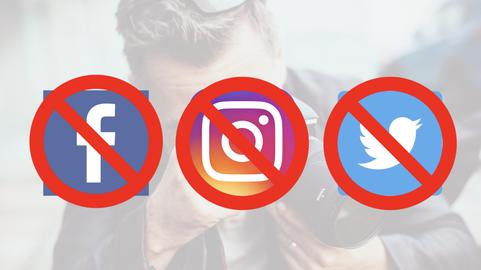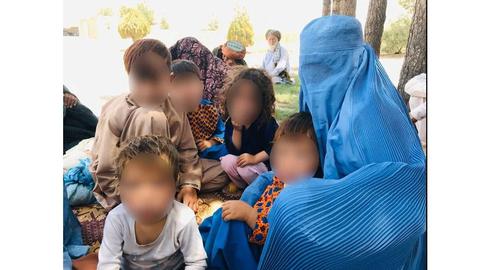In Iran, hardly a day goes by without news of someone being arrested for "illegal activities online.” These types of arrests are hardly new, but they now happen with incredible frequency.
Most recently, on November 3, the police chief for Marvdasht, Fars Province, announced the force had arrested a local for "publishing pictures of women wearing inappropriate clothing.” The photos he was referring to were images of women models posted on Instagram.
On the same day, the police chief for Hormozgan announced that two people from Bandar Abbas had been detained on charges of "sending a video featuring social and urban problems to BBC Persian television service."
"The Persian-language sections of networks such as VOA, CNN and BBC have only one specific and purposeful function: to act against the security and integrity of the Islamic Republic,” the police chief said. People who cooperated with “dissident media” are considred to be “an accomplice to the crime,” he said.
He then speculated about the verdict, citing Article 500 of the Islamic Penal Code before the court hearing took place, saying that the man in question would be sentenced to between three months and one year in prison for "propaganda against the regime."
The arrests of people who share information — whether on social media or by sending material to foreign press — tend to have very little to do with the law and are more a response to ideas, images and content the Islamic Republic government does not like, and which officials may view as undermining their value system and ideology. It’s about the government having control over its citizens.
Often these arrests spring from internet advertisements or posts chronicling daily life and social activity. Over the last two years, law enforcement agents have resorted to violence and repression when dealing with cases of illegal content online.
“Illegal content” can refer to a photograph of a woman's uncovered hair or flesh being posted on Instagram, a crime that has often been dubbed by officials as "spreading prostitution.” Or it can refer to video clips documenting social malaise or economic hardship, which when spotted on Twitter has often been described as "painting a dark picture against the system.”
Are These Really Crimes Under Iranian Law?
Talking to Journalism is Not a Crime, IranWire's legal adviser Musa Barzin Khalifehlou said a lot of the cases brought against people came down to personal decisions by officials who freely interpret the law to suit their agendas. More often than not, they said freedom of expression clashed with Iran’s national security concerns, and that the right to choose one's lifestyle should not put this security at risk.
"For example, in the case of the detention of two citizens in Bandar Abbas, where the police chief referred to Article 500 of the Islamic Penal Code, we see that the law states that anyone who carries out propaganda against the Islamic Republic or in favor of opposition groups and organizations will be sentenced to between three months and one year in prison. But sending a video to the media of what really happened and was not falsified can in no way be an example of propaganda against the regime. People are free under the law to exercise their right to freedom of expression, to criticize the economic or cultural and social situation and to publish it on social media or through the media.”
Barzin Khalifehlou said regarding such activities as a crime was actually a misinterpretation of the law, and that in fact it was a violation of the law to apply such misinterpretations when sentences.
"Even if these arrests are based on Article 508 of the Islamic Penal Code, this article concerns cooperation with foreign states hostile to the Islamic Republic – not sending a video to foreign media.
“On what basis do judges and security officials consider countries such as Britain and the United States as hostile states? A belligerent country is a country at war with Iran, but we are not in the middle of a war. A few years ago, responding to this question, a spokesperson for the Iranian foreign ministry just listed Israel as a hostile country. Nowhere in Iranian law does it say that reporters from Islamic Republic of Iran Broadcasting can report on social issues but that Iranian citizens can’t do the same, or send information to Persian-language TV channels. Also, these citizens do not work with foreign media officially, or based on a salary or on other financial relationships. These people’s intention is simply to reflect and correct the problems of society."
...and Advertising as a Crime
Barzin Khalifehlou also said the Islamic Penal Code does not identify the use of images of women's hair or bodies to advertise a product as falling under the crime of "spreading prostitution."
"Most of these sorts of detentions are based on Article 14 of the Cybercrime Act, which criminalizes the publication of obscene and vulgar content. According to the law, publishing this specific type of content carries a sentence of between 91 days to two years in prison and a fine. But the bottom line is that most of the citizens detained on these charges are hoping to earn make money from online advertising. For example, a hairdresser who posts a picture of a client has no intention of promoting prostitution or nudity. But, due to the ambiguity of the law, judges apply their personal interpretation of the law."
This lack of competency expends to the wider society, because Iranians do not receive education about the law or their rights. This in itself is frustrating and sparks anger. But when a hairdresser or a person who sells clothes or an individual just wanting to share information ends up with a fine or a jail sentence, they are rightly angry. In many cases, those using the internet to do their work are then out of a job. And as these types of arrests grow in number, it will lead to higher unemployment, as well as a greater swell of anger toward the government and its opaque laws throughout all corners of society.
Related coverage:
Why Did Iran Sentence a Teenage Instagram Star to 10 Years in Prison?
Official Study Reveals the Regime’s Fear of Social Media
Citizen Journalist Report: Unemployment, High Prices and a Chaotic Economy
"What Else Can they Do?": Rage and Resignation in Iran Over Internet Filtering Bill
visit the accountability section
In this section of Iran Wire, you can contact the officials and launch your campaign for various problems

























comments